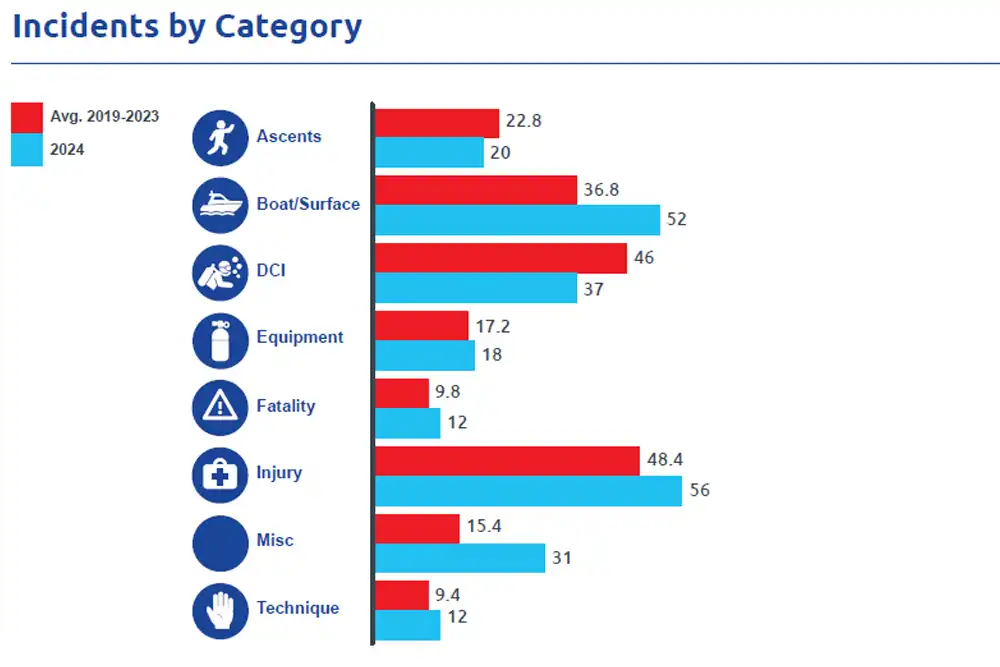
The British Sub-Aqua Club (BSAC) Annual Diving Incident Report for 2024 has been published, with a total of 239 incidents and 12 fatalities recorded throughout the UK.
A further 92 incidents were recorded outside of the UK.
The data are broadly in line with last year’s statistics, which saw 242 incidents recorded with nine fatalities in UK waters.
Once again, the most commonly reported form of scuba diving incident was ‘injury’, with 56 recorded incidents, and 31 further classified as ‘miscellaneous’.
Both are broad descriptions used to categorise incidents reported with insufficient information to assign a more specific classification, which the report’s authors suggest represents an increase in reports submitted with limited detail.
Second most common was boat or surface injuries, with 52 reported incidents, and 37 cases of decompression illness (DCI) were reported, down from the 2019-2023 average of 46.

Notable diving fatality statistics
The average age of the 12 divers who died during the 2024 incident year was 57.4, consistent with previous reports.
Six of the fatalities involved solo diving or buddy separation, including the tragic case of a diver who went missing off the coast of Wales in November 2024, who BSAC notes was using a surface-supplied air system.
‘In recent years we have seen a range of unconventional diving equipment configurations being offered on the internet,’ write the report’s authors.
‘Of note is equipment where small battery-operated compressors are mounted on floats above the diver and deliver air to second stage regulators on 9-12m long hoses.
‘Like all diving equipment, this equipment is readily available online. UK diving organisations and the British Diving Safety Group have all expressed significant concern over the efficacy of such equipment for use even in shallow depths.’
Immersion Pulmonary Oedema (IPO) update
BSAC has further refined its reporting of Immersion Pulmonary Oedema (IPO, or IPE for the US spelling ‘Edema’), with some new information from coroner’s reports providing new evidence that elevates cases previously reported as ‘probable’ instances of IPO to ‘confirmed.’
IPO – which primarily affects divers in cold water, especially those suffering from hypertension (high blood pressure) – is increasingly thought to be the most prevalent cause of non-mechanical scuba diving fatalities.
Although incidents are, overall, very rare, BSAC reports that awareness among divers and training agencies has led not only to a better reporting of cases of IPO, but also increased chances of survival as divers are more likely to recognise the symptoms.
This year’s incident report has logged seven cases of confirmed IPO, none of which were fatal.
Advanced certifications breed complacency

Once again, it is divers with more advanced qualifications that lead the way in terms of diving-related incidents. Dive leaders (equivalent of a PADI Divemaster) and Advanced Divers (equivalent of CMAS four-star diver) together account for 47 per cent of all non-casualty incidents and 31.6 per cent of all casualties, despite being a minority group within the general BSAC diving population.
‘One could argue that these divers are diving more often but nevertheless this graph serves as a valuable reminder that, regardless of qualifications or experience, no diver is immune to becoming involved in an incident,’ write the report’s authors.
‘Complacency has no place in diving – our own safety, and that of our buddies, must remain a constant priority, no matter how experienced and qualified we may be.’
BSAC has been compiling annual reports on diving incidents in the UK since 1965, with data gathered from a variety of sources including members of the via the BSAC incident reporting system, together with annual reports from institutions such as the Maritime and Coastguard Agency (MCA), Royal National Lifeboat Institution (RNLI), MOD Superintendent of Defence Diving, the Royal Society for the Prevention of Accidents (RoSPA) and the Water Incident Database (WAID).
The 2024 report and previous years dating back to 2012 are freely available to download from the BSAC website. If you are a UK diver and need to report an incident, you can do so on the Incident Report Page.


